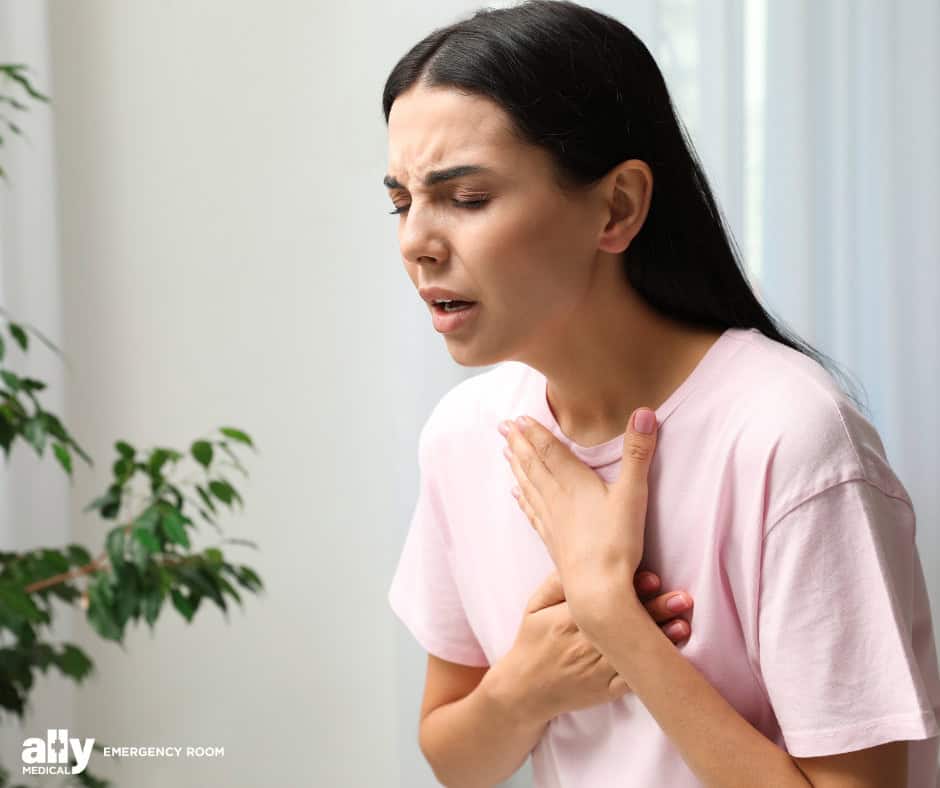Breathing problems can be frightening and are often a sign that something is wrong. Whether caused by asthma, allergies, infections, or other conditions, it’s crucial to understand when to seek emergency care and how to manage these issues.
Recognizing Breathing Problems
Breathing problems can manifest in various ways, and recognizing the signs early can make a significant difference. Common symptoms include:
- Shortness of Breath: Difficulty catching your breath or feeling like you can’t get enough air.
- Wheezing: A high-pitched whistling sound when breathing, often associated with asthma or other respiratory conditions.
- Chest Tightness or Pain: A feeling of pressure or constriction in the chest.
- Rapid Breathing: Breathing faster than normal, often shallow and quick.
- Coughing: Persistent or severe cough that may produce mucus.
- Blue Lips or Face: Cyanosis, indicating a lack of oxygen in the blood.
- Difficulty Speaking: Inability to speak in full sentences without pausing to breathe.

Feeling out of breath after a run? It might be more than just fatigue.
Common Causes of Breathing Problems
Asthma: Chronic condition causing inflammation and narrowing of the airways, leading to wheezing, shortness of breath, and coughing.
Chronic Obstructive Pulmonary Disease (COPD): A group of lung diseases, including emphysema and chronic bronchitis, causing airflow blockage and breathing problems.
Allergic Reactions: Severe allergies can cause swelling in the airways, leading to difficulty breathing.
Infections: Respiratory infections like pneumonia, bronchitis, and COVID-19 can cause significant breathing difficulties.
Heart Problems: Conditions like heart failure can lead to fluid buildup in the lungs, causing shortness of breath.
When to Seek Emergency Care
Certain breathing problems require immediate medical attention. Seek emergency care if you or someone else experiences:
- Severe Shortness of Breath: Struggling to breathe, even at rest.
- Chest Pain or Pressure: Especially if it radiates to the arm, back, neck, or jaw.
- Blue Lips or Face: Indicates severe oxygen deprivation.
- Rapid, Shallow Breathing: Unable to catch your breath.
- Confusion or Drowsiness: Signs of low oxygen levels affecting the brain.
- Worsening Symptoms: Symptoms that rapidly worsen despite using prescribed medications or treatments.
Managing Breathing Problems
While some breathing problems require emergency care, others can be managed with appropriate treatments and lifestyle adjustments.
Medications:
- Inhalers: Quick-relief (rescue) inhalers for immediate symptom relief and long-term control inhalers to prevent symptoms.
- Steroids: Reduce inflammation in the airways.
- Bronchodilators: Help open the airways and make breathing easier.
Lifestyle Adjustments:
- Avoid Triggers: Identify and avoid allergens or irritants that cause symptoms.
- Stay Active: Regular exercise can strengthen respiratory muscles and improve overall lung function.
- Maintain a Healthy Weight: Reduces the strain on the respiratory system.
- Quit Smoking: Smoking damages the lungs and worsens breathing problems.
Home Remedies:
- Steam Inhalation: Helps clear nasal passages and ease breathing.
- Hydration: Drinking plenty of fluids can thin mucus and make it easier to expel.
- Breathing Exercises: Techniques like diaphragmatic breathing can improve lung efficiency.
Trust Ally Medical ER for Immediate Care
If you or a loved one is experiencing severe breathing problems, don’t hesitate to seek emergency care. Your health and safety are our top priorities. For immediate medical attention, visit your nearest Ally Medical ER. If you have questions or need more information about managing breathing problems, consult with a healthcare provider.



